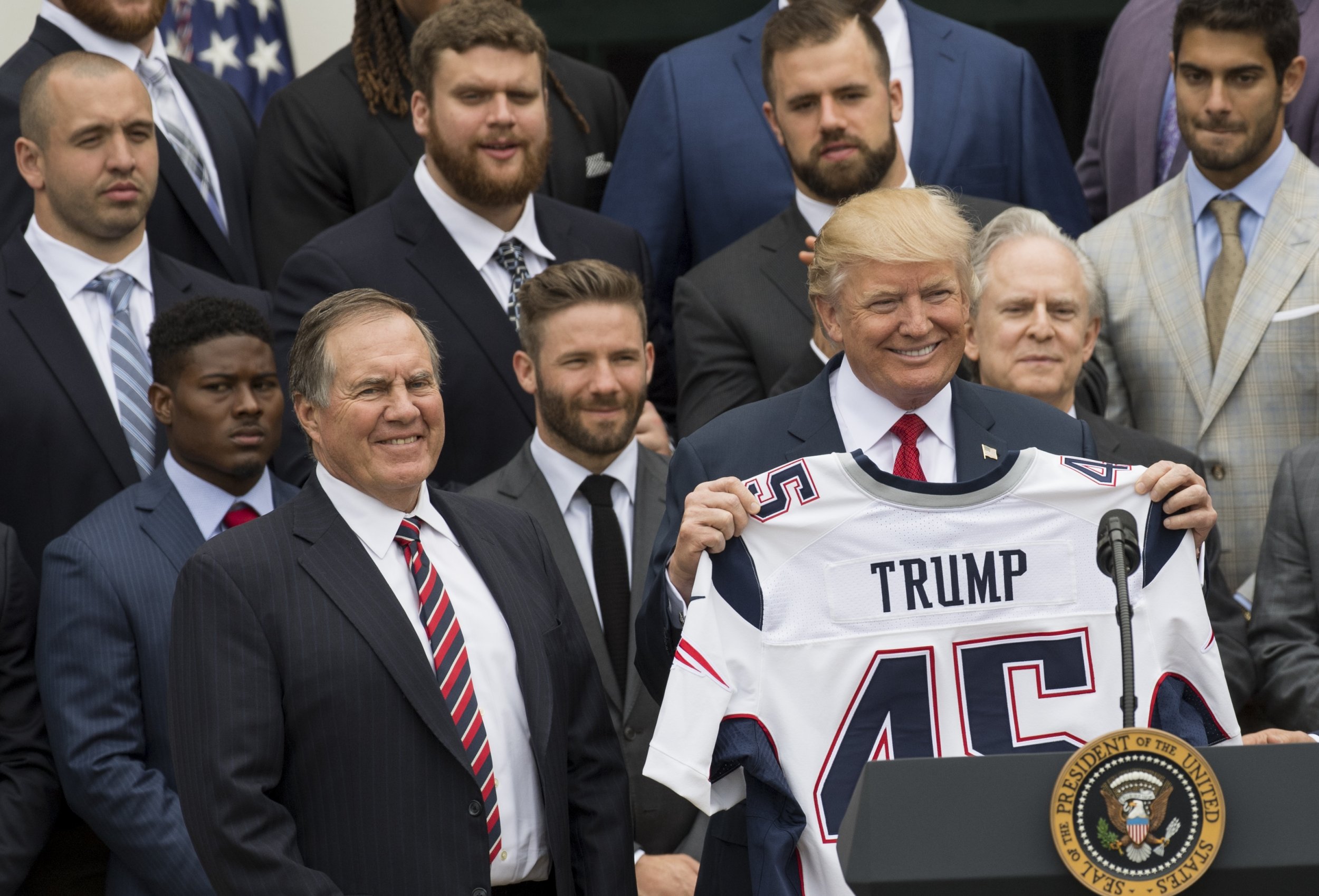
"Bully pulpit" is one of those deceptive phrases that mean the exact opposite of what they seem to. It was coined by Theodore Roosevelt in reference to the presidency, but he was using bully as an adjective, signifying "the national platform the presidency provides to shape public sentiment and mobilize action," as historian Doris Kearns Goodwin has written. A progressive reformer, Roosevelt employed his bully pulpit to carve national parks out of the industrializing landscape, curb corporate power and protect the public welfare by creating agencies like the Food and Drug Administration.
The meanings of words can change, though. President Donald Trump uses the same bully pulpit as Roosevelt, except in his case bully is a noun signifying a person who intimidates and threatens others, perhaps even commits violence against them. His is a pulpit to turn enemies into a bloody pulp.
Roosevelt—and most presidents since—have used the bully pulpit to paint a picture of the republic as it should be, and then to persuade skeptics that, yes, it really should be that way. Trump has articulated no vision for America. Nor, despite his vaunted dealmaking skills, has he been especially interested in the art of political suasion. Instead, he has governed like a bully taking stock of all the terrified souls arrayed before him in the schoolyard. Are you with him or with the weaklings, like "Liddle Marco" and "Lyin' Ted"? Say, if you are a real American, then why are you wearing those funny clothes? And what do you do when the national anthem plays?
Answer incorrectly and you may well end up with a black eye, not to mention a Twitter feed full of vitriol.
In recent weeks, there were encouraging talks of a "bipartisan" Trump willing to work with Democrats, a Trump who'd finally come to understand the solemnity of his office, thanks to the tireless efforts of his relatively new chief of staff, General John Kelly. He was tweeting fewer conspiracy theories. He was becoming presidential.
That wasn't the Trump who showed up on Friday night in Huntsville, Alabama, to rally support for Senator Luther Strange, a mainstream Republican who faces a far-right candidate in a Tuesday special election. This was a Trump who was bellicose and full of bluster, one who fit with almost eerie precision the federal government's own definition of bullying: "making threats, spreading rumors, attacking someone physically or verbally, and excluding someone from a group on purpose."
The rally came at the end of a week marked by the U.N. General Assembly meeting in New York. There, Trump had taunted North Korean leader Kim Jong Un by calling him "Rocket Man" and explicitly vowing to destroy his nation, in what supporters said was bracing realpolitik and what detractors said was complete insanity. Trump continued this line of attack in Huntsville, telling his audience, "We can't have madmen out there shooting rockets all over the place," while blaming his Democratic predecessors for failing to curb North Korea's nuclear program.
"Little Rocket Man, we're going to do it because we really have no choice," Trump continued, leaving little doubt about what "it" might be. Most experts agree that a military strike on North Korea is either a horrible idea or a terrible one. It could lead to the destruction of Seoul, if not Los Angeles.
Trump's self-proclaimed "wingman," Stephen Bannon, gave an oddly frank interview to the liberal magazine American Prospect shortly before being fired from the White House, where he was chief political strategist. "There's no military solution here, they got us," Bannon said of the North Korean conundrum. It may have been a politically unwise admission, but that made his assessment no less correct.
And yet, Trump delights to a troubling degree in taunting Kim, telling the North Korean despot that he will be waiting after school, ready to rumble. This only frustrates the work of serious public servants like National Security Adviser H.R. McMaster, Secretary of Defense James Mattis and U.S. Ambassador to the United Nations Nikki Haley, all of whom know that a diplomatic solution to the North Korean problem is the only solution there can be.
Let's return to the federal government's description of bullies: those who "like to dominate or be in charge of others." Does that sound familiar? Trump is obsessed with reminding the world of how "tough" he is. Not tough enough, mind you, to serve in the Vietnam War. Those heel spurs of his must have been painful. Still, he longs for the affections of Russian strongman Vladimir Putin and his unhinged Filipino counterpart, Rodrigo Duterte.
Looks like many anti-police agitators in Boston. Police are looking tough and smart! Thank you.
— Donald J. Trump (@realDonaldTrump) August 19, 2017
The obsession with toughness also explains Trump's other target on Friday night, which remained his target throughout the weekend: professional football players—namely those who have joined the national anthem protest started by black quarterback Colin Kaepernick, formerly of the San Francisco 49ers and now out of a job. Standing in front of an almost entirely white audience in a state with a long history of racial violence and bigotry, the president addressed the owners of National Football League franchises who, in 36 hours or so, could potentially look down from their luxury boxes to see protests in the works: "Get that son of a bitch off the field right now, he's fired," Trump advised the owners to deal with a protesting player. "He's fired!"
Trump complained that protests like Kaepernick's were "a total disrespect of our heritage. That's a total disrespect for everything we stand for." An expert at racial innuendo, Trump had to know that heritage is a laden word in the South. Nor did Trump have to explain "what we stand for." His reaction to the violence in Charlottesville, Virginia, left little doubt about where he stands, and with whom.
One can fairly suppose that on the flight back to Washington from Huntsville, no one told Trump that it was unseemly to use his bully pulpit to pick on professional athletes, to crash a cultural debate like a linebacker plowing through a 3-year-old's birthday party. Yes, football players are wealthy, and some of them are famous, but he has the nuclear codes. And regardless of whether you agree with Kaepernick, it is clear that he has profound grievances, in particular about the way men of color are treated by law enforcement. A true leader of the nation would have acknowledged those grievances, perhaps even suggested some path to reconciliation. Barack Obama did just that last year, acknowledging both pain and discord. Trump, seeing an easy target, hit it from a running start.
And then he kept going. Trump continued his assault on professional athletes the following morning, via the digital bully pulpit known as Twitter. Except this time, he also lashed out at Stephen Curry, the professional basketball player whose championship team, the Golden State Warriors, had shown no interest in making the customary White House visit.
Going to the White House is considered a great honor for a championship team.Stephen Curry is hesitating,therefore invitation is withdrawn!
— Donald J. Trump (@realDonaldTrump) September 23, 2017
Back to the feds' definition once more (and, just to be clear, while I am using the bullying guidelines lightheartedly, there is really nothing lighthearted about bullying itself): "Social bullying," the guidelines say, "involves hurting someone's reputation or relationship" and can involve "embarrassing someone in public" and "telling other children not to be friends with someone."
If NFL fans refuse to go to games until players stop disrespecting our Flag & Country, you will see change take place fast. Fire or suspend!
— Donald J. Trump (@realDonaldTrump) September 24, 2017
This is precisely what Trump was doing, telling people to boycott professional football games and obviously hoping that the next morning's Fox & Friends would open with a shot of a bonfire of Warriors gear in San Francisco. Except it backfired spectacularly, and when the bully looked over his shoulder, there were few willing to back up his retrograde convictions.
Curry's primary professional nemesis, LeBron James of the Cleveland Cavaliers, called Trump a "bum" on Twitter, while former White House photographer Peter Souza executed a masterful bit of trolling by posting a photograph of Curry enjoying a moment with President Obama in the White House.

The NFL may not be known as a cauldron of social progress, but there was its commissioner, Roger Goodell, issuing a statement that criticized Trump's "divisive comments." Even Robert Kraft, the New England Patriots owner who is a friend of Trump's, said he was "deeply disappointed" by the president. Meanwhile, across the league, players knelt or held hands and, in some instances, refused to come out of their locker rooms for the national anthem. It was, as The New York Times said, "a massive show of solidarity."
During my Broadway show today, the audience joined w/ me and together we stood in solidarity with the NFL players protesting Trump & owners pic.twitter.com/AFkVSrpHXW
— Michael Moore (@MMFlint) September 24, 2017
Indeed, Trump has managed something remarkable, if inadvertent. "I say it is time for us to come together as one united people," he said in his victory speech on November 9. The American people are not united quite yet, but with each passing week of the Trump presidency, we seem to be realizing that the cliché about what unites us being greater than what divides us is thrillingly, improbably true.
That's because there's something the bullying guidelines won't say, perhaps because they are, as Trump would have it, politically correct. And it is this: Nobody likes a bully. Bullies upset the social order, whether of a federal government or a fourth-grade classroom. They cause anxiety, even to those who may not be their direct victims.
And though their antics may amuse, disgust and dismay are never far behind. Trump may have ushered in a "new normal," but he has also reminded us how much we miss the old normal, when a petulant bully wasn't lording it over the vast and wonderful playground called America.
Uncommon Knowledge
Newsweek is committed to challenging conventional wisdom and finding connections in the search for common ground.
Newsweek is committed to challenging conventional wisdom and finding connections in the search for common ground.
About the writer
Alexander Nazaryan is a senior writer at Newsweek covering national affairs.
To read how Newsweek uses AI as a newsroom tool, Click here.








